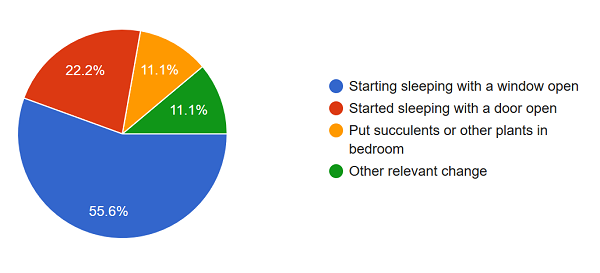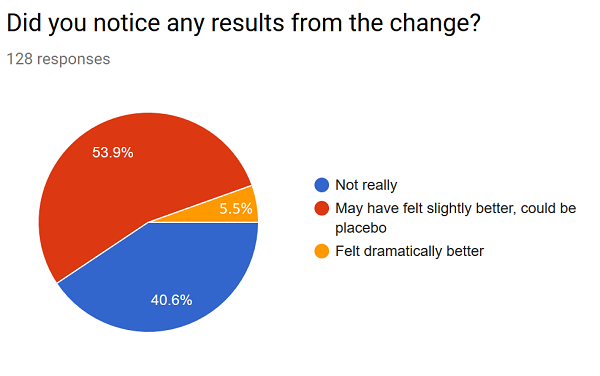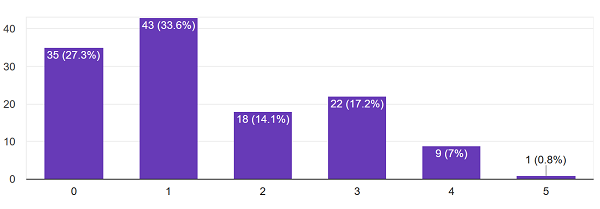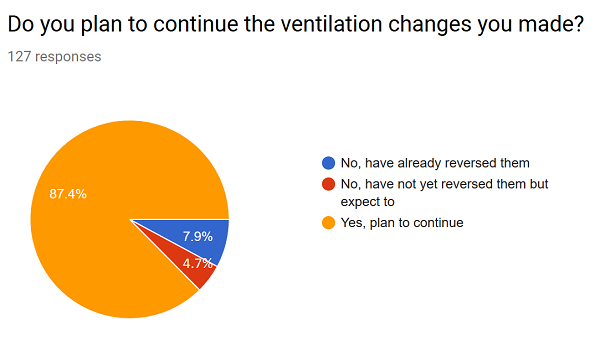Thanks to the 129 people who tried altering their nighttime carbon dioxide levels after my post on this, and who reported back to me. There was no difference between people who pre-registered for the study and people who didn’t, on any variable, so I ignored pre-registration.
126 people reported one intervention they performed. The most common was sleeping with a window open:

People generally reported slight but positive changes:

When asked to rate the magnitude of improvement to well-being on a 0 to 5 scale, they averaged 1.4:

I mentioned in the post that succulents could help in theory, but you needed to get the right kind of succulents and you needed at least ten of them. I was skeptical that anyone really got ten succulents in their room, so I wondered whether that might work as a crypto-placebo group.
If so, the intervention failed to separate from placebo. Succulent users had an average improvement of 1.29, compared to about 1.50 for people who did other things. The difference wasn’t significant, although admittedly the sample size was low.
Looking at the various groups, the most striking difference was actually people who left a window open (1.57) vs. people who did one of the other named options (1.31). A few people who left windows open mentioned this made their room cooler, which seemed to help with sleep. But this is very post hoc, and this difference wasn’t significant either.
Here are some reports from people who described dramatic improvement:
Less headaches, less fatigue in the morning, less trouble staying asleep through the night
I slept more comfortably, woke less in the night, and felt less fatigue in the morning. I also felt more alert during the day. I used a CO2 meter. Peak level changed from 1400s before to 800s after the intervention.
When I get up I feel less groggy, It takes my brain less time to get on line, I can way more often wake up and do things right away rather than spend time in a stunned haze or distracting myself so I don’t fall back asleep. I feel more like doing things and have the energy to back that up, it lasts some time after I wake up but usually not all day. I feel like I sleep better.
And here are some of the more typical results from people who said they felt only minor or placebo-like improvements:
Possibly more alert upon waking, possibly needing slightly less time sleeping to feel rested
Slightly more likely to sleep through the night and/or feel better rested in the morning.
I don’t recall waking up as often, but maybe it’s a placebo. If it’s a placebo, it’s a cheap/free one and I’m happy to keep taking it as long as it works. Oh god is taking this survey going to make it not work anymore?
Despite the underwhelming results, most people were going to stick with their intervention:

I consider these results basically negative – both for nighttime ventilation, and for the ability of informal blog surveys to give data that one can be confident in either way. But I’m glad some people think they feel better, and the results of the last question suggest it still might be a cheap and productive thing to try.
If you’re interested in analyzing this further, you can download the data at this link.

















Copypasted from my tumblr:
This makes me wonder if part of the improvement from having a window open isn’t simply down to modern buildings having much better insulation – old buildings were draughty so there was no need to make sure you had sufficient ventilation, the cold night air creeping in the cracks and crevices did that for you! But modern building codes and materials and the adoption of things like double glazing mean that rooms are now pretty much sealed, so your exhaled night time carbon dioxide (and other sources) builds up internally and isn’t dissipated and can’t get out.
Open a window, and you restore air circulation.
I have been sleeping in a well-ventilated and cool room for as long as I can remember. I am lucky, because I sleep at home the most often, and all three apartments I have lived in made this really easy. In particular, the rooms and the apartments are large (in volume), the previous apartment has windows so badly isolated that I got a lot of fresh air even with the windows closed; and in the current apartment, I live alone, so I just leave the three doors open almost all the time so the air of all rooms are connected. I often sleep with some windows open, but not always, because sometimes the cold outside or the rain and wind or the noise or smells make that impractical. I was also a light sleeper, woke up often for short periods, so I could open or close windows to change the configuration during the night too; but currently I am taking a sedative drug that makes me wake up during the night much less often. Even if I have the windows closed while sleeping, I open the windows for a while every evening to refresh the air in the apartment.
I haven’t made enough experiments to know how much good ventillation helps during sleep. I know that I sleep worse when the room is too warm, since this happens every year for some nights in summer. The sedative drug seemed to mask or change that this summer.
Maybe a problem with the succulent-as-placebo thing is that, while one or two succulents won’t add much oxygen to your room, they will add one or two pretty houseplants to your room, and it’s seems super plausible that having pretty naturey things in your room improves feelings of well being in its own way. I bet a true placebo would do worse than the plants.
Unless the houseplant is a large cactus with thin spines getting under your skin at the lightest touch and causing nasty rashes, and it’s on a wobbly shelf right over the head of your bed. (That’s based on a real story, though I may be exaggerating the details.)
Wait–what? You mean we should just load up the bedroom with, like, houseplants?
Skimming, saw “better sleep,” “try succulents,” and “potted,” so — I tried it. And, true enough, I slept like a baby.
But in fairness, I also opened my window afterwards, so that might be a confounding variable.
IMHO this survey should be considered with “regression to the mean” in mind.
Inevitably there will be a certain number of people who did the experiment because they were feeling bad because of causes unrelated to CO2, had no objective impact from the intervention but will still experience a subjective improvement just because of regression to the mean.
However, the main way I’d interpret the variation of subjective improvement is that I’d expect it to reflect the (lack of) air quality before the intervention. If your nighttime CO2 was not perfect but basically okay, then any intervention will effectively be a placebo; however, for the (possibly small?) portion of people whose nighttime CO2 was really horrible, any improvement might have a significant impact.
In order to evaluate the effectiveness of a treatment, we should first check if the test subjects actually have the problem we’re trying to treat. This survey somehow seems equivalent in giving a tuberculosis drug to a whole hospital floor and surveying the effectiveness without checking which of the patients actually have TB.
Yeah, my first reaction based on the one success anecdote, is that I’d love to see results for people who actually bought a CO2 monitor, and I’d love even more results compared to the before -> after levels on said monitor
I think this is key. In my own case, I already sleep with my door open, so I was skeptical that opening my window as well would help much. I intended to purchase a CO2 monitor to see if I actually had a problem but never got around to it.
there can be a large difference in temperature and quality of air coming from an open door vs an open window, both better and worse for each scenario, depending on weather, pollution etc….
As the original post said, it’s not clear what CO2 levels qualify as problematic in the first place.
Was “I felt worse” or any variant thereof given as an option to the question “Did you notice any results from the change?”
It was not.
I in fact opened both my door and window and then got badly insufficient sleep for a week, at which point I terminated my serious participation in the experiment. I suspect the cause was noise – I don’t sleep with earplugs – but I do wish there had been an option for that.
Oh, hey, a negative finding got published! On a rationalist blog that talks about publication bias and the various replication crises a lot, but still!
I was going to say something about ‘the conclusion is a bit pessimistic; this is basically a free intervention so anyone at all reporting even placebo happiness-increases is a win,’ but then I realized you’d already done that, so… great job as usual, I guess.
Sleep quality would be just as correlated to what was going on in their lives. Like, I sleep better when I’m physically tired at the end of the day, or if I’m slightly sleep deprived. When I’m getting enough sleep, I start dreaming, and then start waking up in the middle of the night, but that might be because I have unburned energy, or am actually reverting to sleep patterns that were previously natural: http://www.medievalists.net/2016/01/how-did-people-sleep-in-the-middle-ages/
But that does mean I need to budget extra going-back-to-sleep and waking up transition times so that I’m not in the middle of a cycle when I want to get up in the morning. Groggy from poor cycle timing instead of groggy from poor air quality may confound survey answers, too.
So the quality of sleep should probably have more data than a Yes/No question. Recording the hours slept, the hours since the last sleeping, self-evaluation of mental state before sleeping, presence of dreams, whether they woke up in the middle of the night and if that disrupted their scheduled waking, etc.
(I personally can’t start leaving the window open overnight. It only takes once waking up to ANTS! ANTS CRAWLING THROUGH! ON THE WALLS! ON THE BED! ON THE DESK! to put the kibosh on that.)
But it seems that simply cacti is probably poor choice, anyways. NASA’s choices for air purifying plants aren’t succulents (though they wouldn’t be CAM), and some of the specific recommended succulents like deltoideas or pinnatum have a “leafier” look.
I didn’t participate in this study because I’m already confident that I sleep better with an open window in September, due to temperature.
I didn’t publish results on this because i’ve been leaving a window open for years but not for the benefits listed. If I don’t leave a window open then, over the course of probably 2 to 4 weeks, the room will smell really bad (like someone else’s sweaty armpit bad… god knows how bad it is for someone who hasn’t contributed to the odor). I feel like most of my sleeping issues come down to 1) back alignment problems or 2) mild dehydration (i.e. not drinking enough fluids).
I think another problem with this study is that it excludes people that are more susceptible to these effects because they likely already use these tricks. My wife, for instance, always sleeps with open windows when the temperature allows, because fresh air is very important for her sleep quality. She also becomes claustrophobic in smelly or stuffy places, I think there was a post about the relation between these two things, so she seems to be more sensitive to lack of oxygen.
I seem to vaguely remember that Baden-Powell recommended “always sleep with the window open, then you will never catch cold” or something like that.
My 2 cents , even though I didnt participate in the study…. many times, in the house or apt. I have been living in, opening the door would have exposed me to light, noise, and cooking smells from downstairs or outside rooms ( I have never lived completely alone, BTW) that would disturb sleep, so thats a pretty clear negative. Regarding keeping windows open, I try to do that as often as I can , even in colder winter weather, since I both thrive on fresh air and do sleep better in a cold room. (I dont do well with large temp changes through the day anyways) Unfortunately, in past years we have had weeks of summer affected by wildfire smoke that have greatly decreased outside air quality, whence I made do with an air cleaner and closed windows and doors. But most of the time, its open window for me
Well, why don’t I come and start a fight? 🙂
https://www.gardenmyths.com/garden-myth-born-plants-dont-purify-air/
Hi. Great timing. I’m actually making an air filter to get rid of CO2. Basically I’m going to coat a tangled mess of thin wire in clay, fire it to ceramic. Then I’ll impregnate the (still porous) ceramic with washing soda (sodium carbonate), which I’ll heat to get rid of any sodium bicarbonate.
The idea is for the washing soda to absorb CO2 and form sodium bicarbonate (baking soda). Once the filter is used up, all I have to do is put it in an oven to drive off the CO2 and turn the baking soda back into washing soda.
Anyway, it’s just an idea.
Btw, I’ve noticed for years that sleeping with the window open is absolutely fantastic for my health. Unfortunately during the spring and summer it gets too hot in the early morning (costing electricity), and the rest of the year there are people heating their homes with wood (wood smoke makes me sick).
Also worth mentioning: poorly ventilated furnace systems can cause minute amount of carbon monoxide to draft into second-story rooms. My doctor mentioned this after I passed out a year ago. We had some HVAC work done a few months later, and the HVAC people ended up rerouting the furnace ventilation pipe (without suggestion from me, I didn’t take the idea seriously at the time).
Other important tips: 99% of air purifiers don’t filter gasses, they filter particles. If you think you need to filter gasses, buy a gigantic carbon filter, like this one (the link is for example only, there are other suppliers on Amazon too, it’s the size that matters).
It must be truly enormous to have any effect. How long the filter lasts depends on use; when I lived near construction with a lot of paint fumes I had a filter last a few months, but they can last much longer if the air is relatively clean.
Another tip, control humidity. Too much and too little (especially way too much and way too little) isn’t good for you; I read an old trade journal on boiler workers (this was ~1920s I think) that said the biggest improvements for worker health came when they improved ventilation and kept humidity from building up.
I always sleep better when I sleep with a exterior door or window open, but I suspect it has a lot more to do with lowering the temperature of the room than any other factor.
I’m not 100% sure about the math used here but there is this: https://gerrieswart.com/2018/09/06/using-plants-to-improve-your-sleep/
Assuming the math is correct you’ll easily need 35 plants or more.
I got a CO₂ monitor and now I can’t sleep because of the red flashing light warning me that the CO₂ is too high. (I turned off the alarm.)